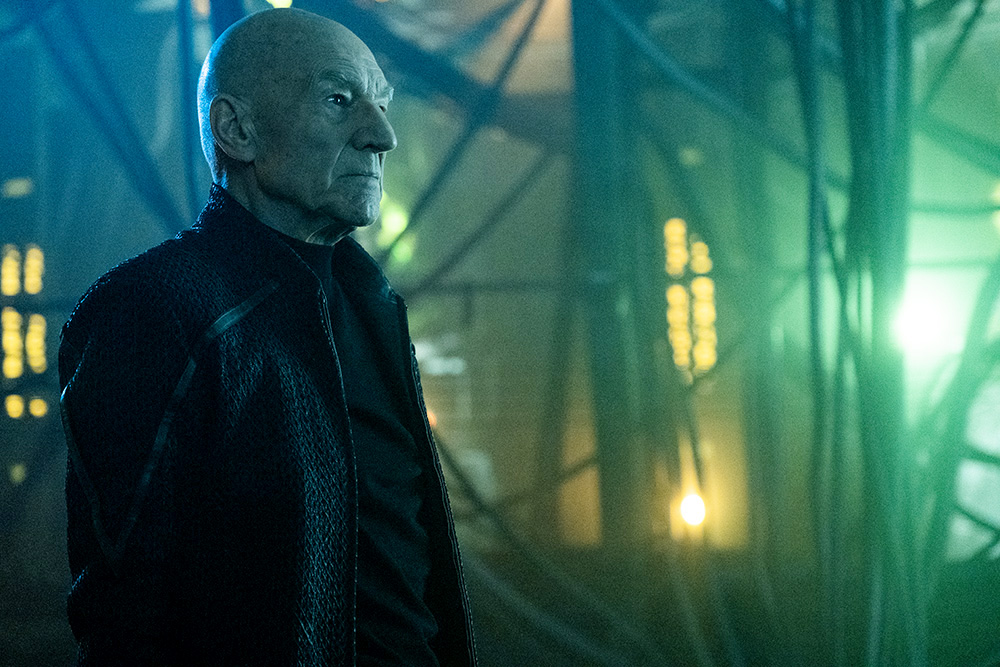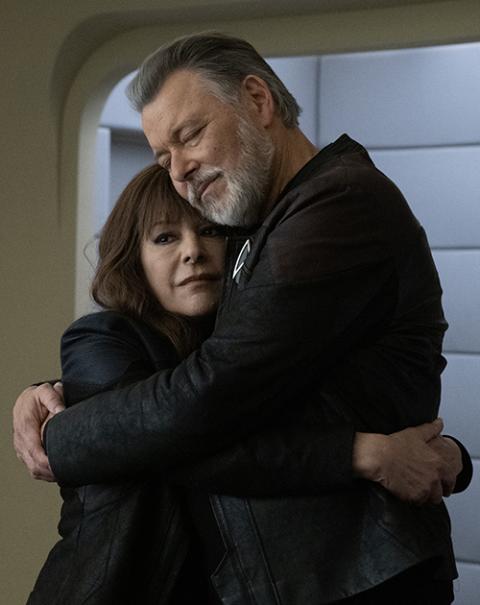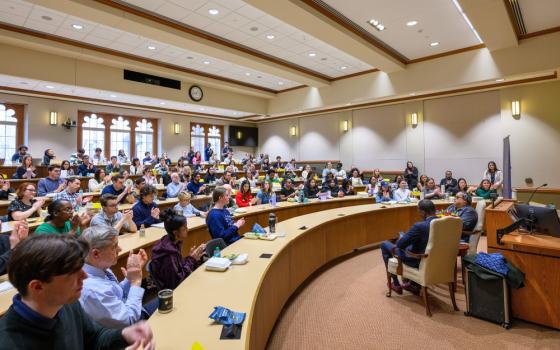
Patrick Stewart as Admiral Jean-Luc Picard in "Star Trek: Picard" on Paramount+. (Paramount+/Trae Patton)
To boldly go where no one has gone before.
This line — taken and tweaked from the opening narration of the original 1966-69 "Star Trek" series — aptly sums up the entire promise and premise of the "Star Trek" franchise.
The casual viewer might get caught up on the narration that precedes it: Something about space and strange new worlds and new life and civilizations. It's tempting to write "Star Trek" off as a silly show about aliens and spaceships and something called a Klingon.
Space might be the backdrop, spaceships may be the mode of transportation and aliens may indeed be everywhere, but where our characters must boldly go is not really a place.
Not a physical one, at least.
The final season of "Star Trek: Picard" reminded us of this necessary truth time and again.

Marina Sirtis as Deanna Troi and Jonathan Frakes as Will Riker in "Star Trek: Picard" on Paramount+. (Paramount+/Trae Patton)
"In the nebula, I came face-to-face with bleakness," a beaten-down, captured but not at all broken Capt. William Riker admits to his wife, Deanna Troi. Riker had narrowly escaped one near-death experience only to find himself trapped in another. The old captain trails off. "I haven't felt that [bleakness] since ..."
A lot has happened since those days on the Starship Enterprise; since Jonathan Frakes and Marina Sirtis originally portrayed Riker and Troi, respectively, on "Star Trek: The Next Generation"; since those characters were young and going boldly about the galaxy. A lot has happened — but perhaps nothing so significant as their marriage, the birth of their children, and the death of their son.
The yawning chasm of grief torn open within Riker by the death of his son could not be escaped, no matter how far into the final frontier he fled. Whether you're on the run from a homicidal changeling intent on the destruction of your entire crew or you're grappling with the loss of a loved one — the sorrow, grief, the feelings of inadequacy and lament are the same.
Bleakness. Darkness. Riker saw in himself and in his own pain something of the entire universe: a nebula's worth of nothingness. The scale of it didn't matter: saving his crew or muddling through his own woundedness. Epic or intimate, it required the same courage, the same grappling-with-self.
And he had to face it. Not to save the galaxy. Not to save his crew. Simply to understand himself, his own wounds, and to then muddle onward in serving, protecting, inspiring those around him.
Advertisement
In the series finale, the titular hero, Admiral Jean-Luc Picard — played, of course, by Patrick Stewart — is faced with his own invitation to boldly go more deeply into grief. The son he's only just met, Jack Crusher (Ed Speleers), appears to be lost, assimilated into the hive mind — the collective consciousness — of the nefarious Borg. Picard risks himself to reach the boy, joining Jack in the hivemind in a last-ditch effort to pull him out.
Jack refuses, claiming that being part of the Borg has cured him of his loneliness — his sense of being perpetually other — and Picard must make a choice. The torpedoes have already been fired; the Borg will be destroyed. And Picard knows this.
But he decides to stay with his son. He decides to be the antidote to Jack's loneliness. He decides to be the kind of father he himself never had.
It's a moment of relationship, one that does not have cosmic but rather intimate implications. Those torpedoes are already barreling down on the Borg cube, after all; Picard and Jack can only stand to save themselves.
The whole of the universe, bound up in a simple gesture: Picard glimpses something of himself, of who he was and might yet be, of the meaning behind the ongoing mission of his life.
The challenge of 'Star Trek' is to boldly go deeper and deeper into what is alien about ourselves until nothing remains unknown, deeper and deeper into what it means to be human.
And save themselves they do. Picard's Season 2 quest into his own past has prepared him to give freely of himself now in Season 3, to dig deeply into who he is and who he is becoming: the legacy he swore he never needed.
The French Jesuit priest and scientist Pierre Teilhard de Chardin wrote: "The deeper I descend into myself, the more I find God at the heart of my being ... the God who pursues in me the task, as endless as the whole sum of centuries, of the incarnation of his Son."
Buried within the quietness of our own stories — and the relationships they point us to — we encounter the entirety of God's creation, and within the vastness of God's creation we are drawn back into ourselves, into the uniqueness of who we are and are becoming.
The invitation, the challenge, of "Star Trek" is to boldly go deeper and deeper into what is alien about ourselves until nothing remains unknown, deeper and deeper into what it means to be human. Space may be the final frontier, but its vastness is but a mirror held up to the inner journey our characters — and, by extension, each of us viewers — must make within ourselves.
The desire to know ourselves is ongoing work.
Or, as Data says: "It seems being human is just as difficult as the desire to be human, and infinitely more complex than I ever considered."








